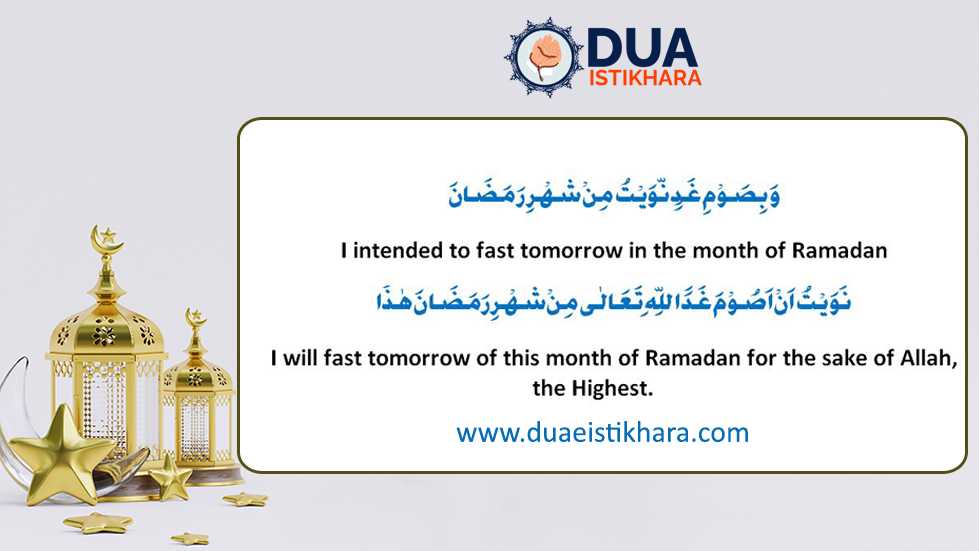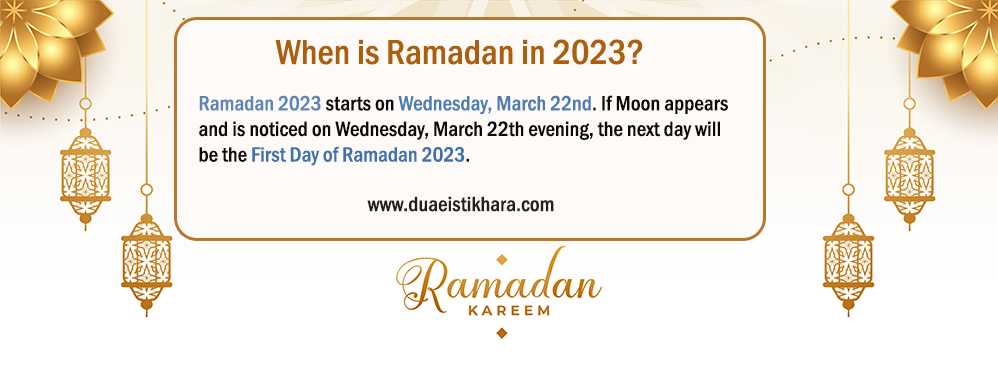Ramadan (رمضان) is the holy month of Islam, full of blessings and forgiveness. Every Muslim wishes to preserve the maximum acceptance of this month. We thank Allah almighty, He blessed this glorious month once again so we can seek forgiveness of our sins. Ramadan is a very spiritual month for Muslims as compared to other months.
Roza rakhne ki dua Intention (Niyat) to Fasting
Roza rakhne ki dua also called Niyat is the name of the heart’s intention (نیت), so if someone gets up at dawn to fast and fast after eating and drinking, this is his intention. Many scholars believe that it is Mustahib (مستحب) to say with the tongue. Well, three words are more common for Fasting intention.
Dua is not just about asking for material things, but also about seeking guidance and forgiveness from Allah. It is a way to connect with our Creator on a deeper level and to express our gratitude for the blessings in our lives. Muslims are encouraged to make dua at all times, but especially during Ramadan when the gates of heaven are open and the reward for good deeds is multiplied.

وَ بِصَوْمِ غَدٍنَّوَیْتُ مِنْ شَھْرِ رَ مَضَانَ
I intended to fast tomorrow in the month of Ramadan
نَوَیْتُ اَنْ اَصُوْمَ غَدًا لِلّٰہِ تَعَالٰی مِنْ شَھْرِ رَمَضَانَ ھٰذَا
I will fast tomorrow of this month of Ramadan for the sake of Allah, the Highest.
Roza kholne ki dua
“Roza kholne ki dua” is the Arabic phrase for the dua (supplication) that is recited when breaking the fast during Ramadan. The transliteration and translation of the dua are as follows:
The Importance of Dua During Iftar
Iftar is a special moment in the day when Muslims break their fast and come together to share a meal. It is also an opportunity to make dua. Muslims are encouraged to make dua during iftar and to ask Allah for forgiveness and blessings.
This dua is a powerful expression of faith and gratitude to Allah for His blessings. It is a reminder that everything we have comes from Allah and that we should be grateful for His provision.

Other powerful dua to say during iftar include:
- “Allahumma inni as’aluka bi rahmatika al-lati wasi’at kulla shay’in an taghfira li” (Oh Allah, I ask for Your mercy that encompasses everything, so forgive me).
- “Allahumma innaka afuwwun tuhibbul afwa fa’fu anni” (Oh Allah, You are forgiving and love forgiveness, so forgive me).
اَللّٰھُمَّ اِنِّیْ لَکَ صُمْتُ وَبِکَ اٰمَنْتُ وَ عَلَیْکَ تَوَکَّلْتُ وَ عَلٰی رِزْقِکَ اَفْطَرْتُ
Translation: O, Allah! I fasted for You and I believed in You and I trusted in You and I open my fast from Your sustenance.
Transliteration: Allahumma inni laka sumtu wa bika aamantu wa ‘ala rizqika aftartu
When is Ramadan in 2023?
Ramadan 2023 starts on Wednesday, March 22nd. If Moon appears and is noticed on Wednesday, March 22th evening, the next day will be the First Day of Ramadan 2023. It will last 29/30 days, depending on the Eid-ul-Fitar Moon’s appearance. A committee announces the sight of Moon as a witness.

What is Ramadan?
Ramadan is derived from the Arabic word (Ramd رمض) which means “to heat or scorch heat stones. The burning land called Ramda, the first Ramadan of Islamic history came on scorching days. Because Fasting in this month burns all sins, that is the reason Muslims call it Ramadan.
انما سمی رمضان لانہ یرمض ذنوب عباداللہ
Indeed, Ramadan is named because it burns the sins of Allah’s servants.
Ramadan calendar 2023
Sunday |
Monday |
Tuesday |
Wednesday |
Thursday |
Friday |
Saturday |
| 01 Ramaḍan 23 March |
02 Ramaḍan 24 March |
03 Ramaḍan 25 March |
||||
|
04 Ramaḍan |
05 Ramaḍan 27 March |
06 Ramaḍan 28 March |
07 Ramaḍan 29 March |
08 Ramaḍan 30 March |
09 Ramaḍan 31 March |
10 Ramaḍan 01 April |
|
11 Ramaḍan |
12 Ramaḍan 03 April |
13 Ramaḍan 04 April |
14 Ramaḍan 05 April |
15 Ramaḍan 06 April |
16 Ramaḍan 07 April |
17 Ramaḍan |
|
18 Ramaḍan |
19 Ramaḍan 10 April |
20 Ramaḍan 11 April |
21 Ramaḍan 12 April |
22 Ramaḍan 13 April |
23 Ramaḍan 14 April |
24 Ramaḍan |
| 25 Ramaḍan 16 April |
26 Ramaḍan 17 April |
27 Ramaḍan 18 April |
28 Ramaḍan 19 April |
29 Ramaḍan 20 April |
30 Ramaḍan |
Dua e Qunoot, with translation into English and Urdu
Importance of Ramadan
Ramadan Kareem is the only month mentioned in the Holy Quran, and it is one of the four months in which war is haram (however, it is allowed in some cases). Other heavenly books Bible, Torah, Various Scriptures, and Psalms, are also revealed in Ramadan.
Allah says in Surah Al Baqra Ayat : 183
یٰٓاَیُّھَاالَّذِیْنَ اٰمَنُوْا کُتِبَ عَلَیْکُمُ الصِّیَامُ کَمَا کُتِبَ عَلَی الَّذِیْنَ مِنْ قَبْلِکُمْ لَعَلَّکُمْ تَتَّقُوْنَ
O believers! Fasting is prescribed for you—as it was for those before you1—so perhaps you will become mindful ˹of Allah۔
Allah describes the details of Fasting in the very next Ayat of the Quran. There are the details of the day’s limits and conditions for stopping Fasting.
اَيَّامًا مَّعْدُوْدَاتٍ ۚ فَمَنْ كَانَ مِنْكُمْ مَّرِيْضًا اَوْ عَلٰى سَفَرٍ فَعِدَّةٌ مِّنْ اَيَّامٍ اُخَرَ ۚ وَعَلَى الَّـذِيْنَ يُطِيْقُوْنَهٝ فِدْيَةٌ طَعَامُ مِسْكِيْنٍ ۖ فَمَنْ تَطَوَّعَ خَيْـرًا فَهُوَ خَيْـرٌ لَّـهٝ ۚ وَاَنْ تَصُوْمُوْا خَيْـرٌ لَّكُمْ ۖ اِنْ كُنْتُـمْ تَعْلَمُوْنَ
Fast a prescribed number of days. But whoever of you is ill or on a journey, let them fast an equal number of days after Ramaḍân. For those who can get only fast with extreme difficulty, 2 compensation can be made by feeding a needy person ˹for every day, not fasted˺. But whoever volunteers to give more is better for them. And too fast is better for you, if only you knew.
What Makes Ramadan Very Special?
The prophet Muhammad (PBUH) explains the importance of Ramadan very absolutely. Here I am describing some primary values of Ramadan Kareem.
- Fasting is an essential part of Islam and has been strongly recommended. There are many physical benefits of Fasting, as proved in modern science. It cleans our bodies very effectively every year. So Ramadan is a blessing of God for his servants.
- The Holy Quran, which is mercy and guidance for all the world, was revealed during Ramadan.
- The third aspect of the goodness of Ramadan is that the Laila Tul Qadar (لیلتہ القدر) comes in this month. According to Quran, worshiping on this night is better than thousand-night worship.
There are many Hadiths about Fasting by Hazarat Muhammad (PBUH). Let us now examine some hadiths that will make the virtues of Ramadan clear to us.
The Holy Prophet Hazrat Muhammad (peace be upon him) said.
- Fasting is a shield from the fire of Hell, the Same as you have a shield for battle.
- As Ramadan starts, the doors of Heaven are opened, the Doors of Hell are closed, and the devils are restrained.
- Whoever fasts in this Ramadan with belief and intention of reward, all his previous (minor) sins are forgiven.
Online Istikhara, The Way to Consult With Allah

Benefits of Fasting in Ramadan
Ramadan leaves many positive effects on humans in his life and after death. The most important of these effects is moral training. Fasting creates immunity and willpower in a person with time restrictions by remaining hungry with the availability of water and food, controlling lusts and desires.
The stomach is an important part of our body that works all year round. Fasting provides rest and also helps to make a strong digestive system.
What are the rules of Ramadan?
It is essential to understand the basic rules of Fasting.
The Obligation of Fasting Ramadan
- Being Muslim
- To be wise
- Becoming an adult
- To be healthy
- To be domiciled
- A woman should be free from menstruation.
Valid Exemptions for Not Fasting Ramadan
- A person is suffering from a disease that causes tough.
- You can skip Fasting when you are traveling. But the amount of travel will be valid.
- If a person is so weak due to old age or any other reason and has no hope of regaining strength, it is acceptable to leave Fasting and give Fidya.
- In Ramadan, if a woman is pregnant or feeding a kid and there is a chance of harming her or the child’s health by Fasting, she can leave the Fasting.
- During the war, fighting against the enemy, if you feel Fasting can cause your weakness and affect your performance, you are allowed to stop Fasting.
Recite this dua at the time of opening the fast:
اَللّٰھُمَّ اِنِّیْ لَکَ صُمْتُ وَبِکَ اٰمَنْتُ وَ عَلَیْکَ تَوَکَّلْتُ وَ عَلٰی رِزْقِکَ اَفْطَرْتُ
O, Allah! I fasted for You and I believed in You and I trusted in You and I open my fast from Your sustenance.
What things do not break the Fast?
- Brushing
- Applying oil to the scalp
- Applying lead to the eyes
- Smelling perfumes
- Forgetting food and drink
- Bathing but not getting water in the throat
- Spontaneous vomiting (vomiting).
- Bleeding from the teeth
- Unintentional running of water in the ear or nose
- Getting swollen
- Rinsing
- Pour cold water on the head
- Using an inhaler in case of respiratory distress
- Using eye drops
What Acts Invalidate Fasting?
- Deliberately eating, drinking, or having intercourse breaks the fast.
- Slowly inhaling the smoke of cigarettes or hookah etc., into the mouth or nose.
- Extracting an object the size of a gram or less stuck in the teeth
- Deliberately gagging (vomiting).
- Putting medicine in the ear or nose
- Watery throat while rinsing the mouth
- If the blood went into the stomach with the saliva and the blood prevailed over the spit.
Atonement for breaking the fast
If the fast of Ramadan or any other post-natal fast is broken due to a Shariah (شریعہ) excuse, it is obligatory to pay Qadha (قضا). For breaking the fast of Ramadan without reason, the plenty is fasts for two consecutive months, i.e., sixty days. If he does not have the strength to do so, he should feed sixty poor people with full meals at both times.
Conclusion
Remember that the virtue of Ramadan is not only in Fasting and performing prayers, but its primary purpose is to save oneself from sins. Try not to commit any sin.
- Not to disobey Allah
- Never tell lies,
- Not to backbite
- Do not hear anything wrong, and do not speak anything lousy.
- Do not eat from usury and avoid haram wealth.
Are you Looking for Online Istikhara Services?
| Quran Stories for Kids: A Collection for Young Learners |
